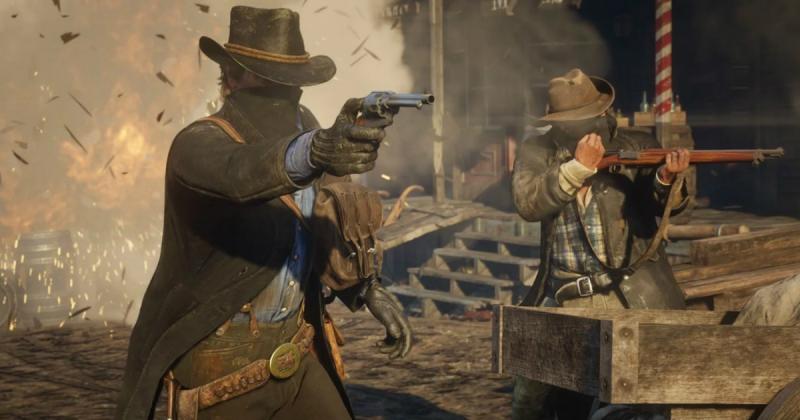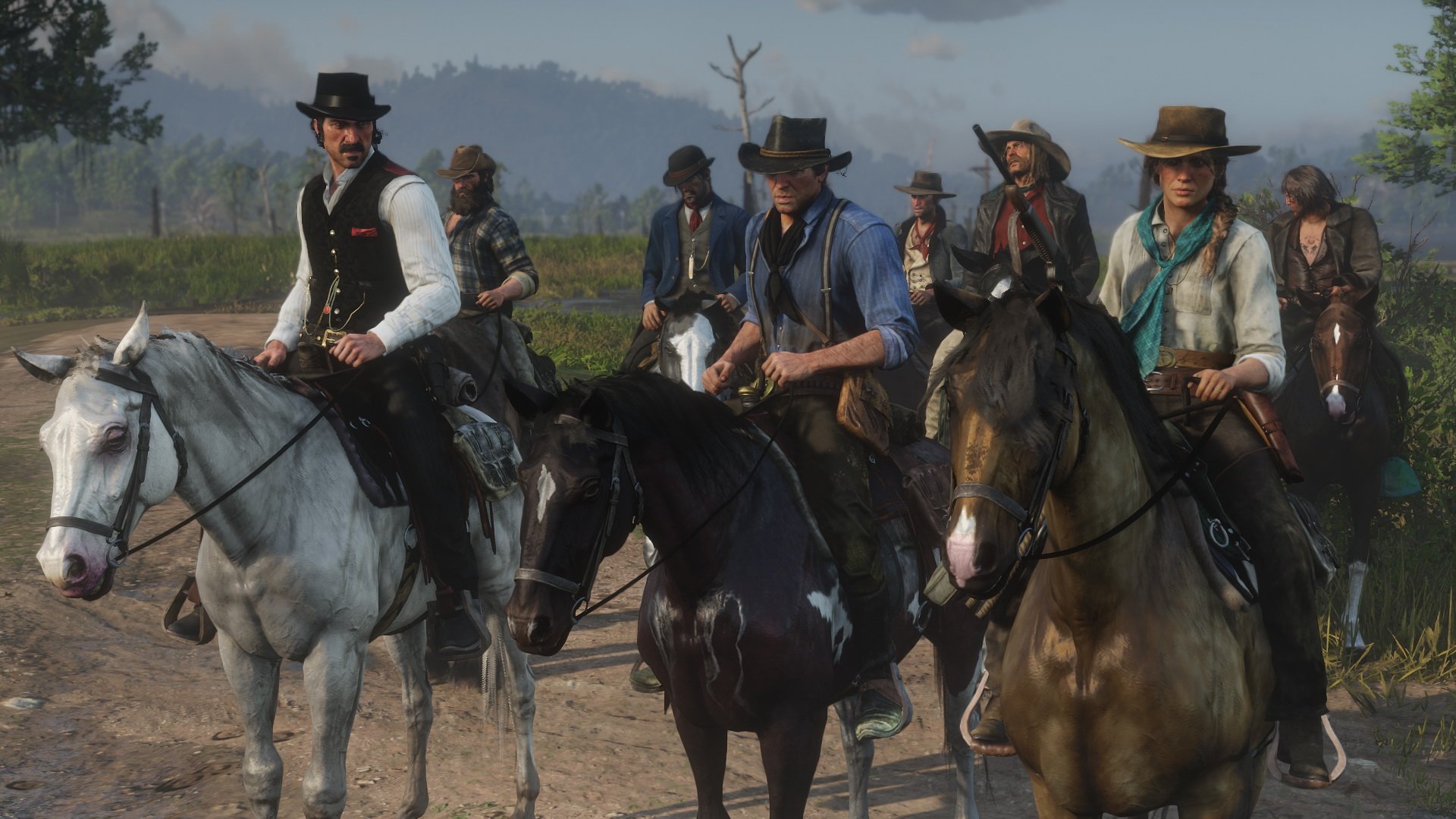Red Dead Redemption 2 review - the cowboy drama makes a triumphant return | reviews, news & interviews
Red Dead Redemption 2 review - the cowboy drama makes a triumphant return
Red Dead Redemption 2 review - the cowboy drama makes a triumphant return
An ambitious Wild West odyssey that matches epic scale with benchmark skill

Realistic open world games need the little touches to convince you of the reality within which you play. Perhaps it’s your character’s beard that grows a little more each day, maybe it’s the way mud builds up on his boots during wet weather, or how he makes a cup of coffee and talks to members of his 20-strong gang in the morning.
The year is 1899, 12 years before the first adventure, and you’re in the cowboy boots of Arthur Morgan, a member of a tight-knit group of outlaws led by a charismatic leader by the catchy name of Dutch Van Der Linde, whose main goal is to live life as a law-ignoring free man while avoiding civilisation as far as his horse will take him.
Police officers or sheriffs will die by the morgue-load
Horses are useful as Arthur’s fellow gang members are a transient bunch, constantly on the move or on the run and never staying in one spot for long. The gang is made up of a mixed bunch including Mexicans, Native Americans a widow hell bent on revenge and an ex-clergyman lost to debauchery, to name but a few – and it’s the interchanges and plot reveals that come from dialogue that brings the game to life.
Much of the action draws obvious parallels with the GTA series – there are shootouts aplenty, more chase sequences than you could wave a chequered flag at, and police officers or sheriffs will die by the morgue-load. The life of an anti-hero, whatever the era, has "fight the power" tattooed on his cold, cold heart.
But this sandbox game approaches the gameplay structure in a very different way. In the past you would have primary missions that propel you towards the ultimate narrative goal. You also had a wealth of secondary pursuits – the bit where developers would give superfluous tasks that flesh out the skeleton of the world, such as hunting animals or fetch quests for chance-met characters.
There was always a disconnect between what you had to do and what else you could do – the secondary objectives rarely feeding the primary goals and vice versa. Well, all that has changed. Now everything you do has a context and is relative to your one primary goal, survival. You’re now part of a much larger outlaw gang – constantly needing money, food, shelter – the cornerstone of Maslow’s Hierarchy of Needs pyramid.

What that means is that when you go hunting, it’s not a trivial pursuit, it’s a way to feed the group. Similarly, playing poker isn’t just a pastime, it’s a way to earn money for the gang – and with this new meaning comes a new reason to fully engage with what’s going on in the world around you. All of these activities spring up organically, rather than a pull-down on an illusion-breaking options menu, further reinforcing the immersive flow of the game.
While the structure has changed, the actual gameplay is reminiscent of previous Rockstar titles, and ultimately this is a game about fighting, killing and survival – but it has deep themes of racism, sexism and the growing threat of urbanisation that delivers a fresh approach, via the beautifully scripted dialogue.
RDR2 is the single most accomplished game to come out this year – and a must-have for anyone with a passing interest in nuanced characters, immersive worlds, rich storytelling and gunfights on horseback.
rating
Explore topics
Share this article
The future of Arts Journalism
You can stop theartsdesk.com closing!
We urgently need financing to survive. Our fundraising drive has thus far raised £49,000 but we need to reach £100,000 or we will be forced to close. Please contribute here: https://gofund.me/c3f6033d
And if you can forward this information to anyone who might assist, we’d be grateful.

Subscribe to theartsdesk.com
Thank you for continuing to read our work on theartsdesk.com. For unlimited access to every article in its entirety, including our archive of more than 15,000 pieces, we're asking for £5 per month or £40 per year. We feel it's a very good deal, and hope you do too.
To take a subscription now simply click here.
And if you're looking for that extra gift for a friend or family member, why not treat them to a theartsdesk.com gift subscription?
more Gaming
 'We are bowled over!' Thank you for your messages of love and support
Much-appreciated words of commendation from readers and the cultural community
'We are bowled over!' Thank you for your messages of love and support
Much-appreciated words of commendation from readers and the cultural community
 Kelly Clancy: Playing with Reality - How Games Shape Our World review - how far games go back
The acclaimed neuroscientist on the world and history of games, in all their variety
Kelly Clancy: Playing with Reality - How Games Shape Our World review - how far games go back
The acclaimed neuroscientist on the world and history of games, in all their variety
 Rage 2 review – garish but great post-apocalyptic shooter
Challenge The Authority in this 'Mad Max on mushrooms' renegade romp
Rage 2 review – garish but great post-apocalyptic shooter
Challenge The Authority in this 'Mad Max on mushrooms' renegade romp
 World War Z review - bloodthirsty fun with the zombie apocalypse
Chainsawing the brain-eaters as you battle against the tide of the undead
World War Z review - bloodthirsty fun with the zombie apocalypse
Chainsawing the brain-eaters as you battle against the tide of the undead
 The Lego Movie 2 Videogame review - everything is not awesome
Few fresh ideas means this movie adaptation treads the same old ground
The Lego Movie 2 Videogame review - everything is not awesome
Few fresh ideas means this movie adaptation treads the same old ground
 Anthem review - singing praises? More like a cautious nod
A rocky start for a new franchise that offers potential and problems in equal measure
Anthem review - singing praises? More like a cautious nod
A rocky start for a new franchise that offers potential and problems in equal measure
 Crackdown 3 review - spectacular super-powered action that was great fun many years ago
Nearly a decade has passed since the last incarnation but little has changed in this stagnant shooter
Crackdown 3 review - spectacular super-powered action that was great fun many years ago
Nearly a decade has passed since the last incarnation but little has changed in this stagnant shooter
 Battlefield V review - WWII on an epic scale
The veteran series returns for another ambitious tour of duty
Battlefield V review - WWII on an epic scale
The veteran series returns for another ambitious tour of duty
 Fallout 76 review - how to wreck a perfectly good legacy with one messy game
When home runs go horribly wrong
Fallout 76 review - how to wreck a perfectly good legacy with one messy game
When home runs go horribly wrong
 Red Dead Redemption 2 review - the cowboy drama makes a triumphant return
An ambitious Wild West odyssey that matches epic scale with benchmark skill
Red Dead Redemption 2 review - the cowboy drama makes a triumphant return
An ambitious Wild West odyssey that matches epic scale with benchmark skill
 Call of Duty: Black Ops 4 review – less is more
Solo rations have been relegated from this benchmark war series
Call of Duty: Black Ops 4 review – less is more
Solo rations have been relegated from this benchmark war series
 FIFA 19 review - the best just got a bit better
It looks and plays great, but what’s new?
FIFA 19 review - the best just got a bit better
It looks and plays great, but what’s new?
